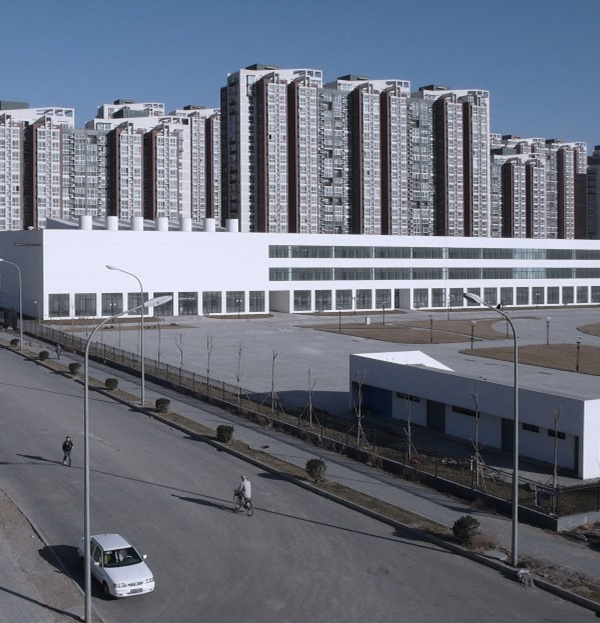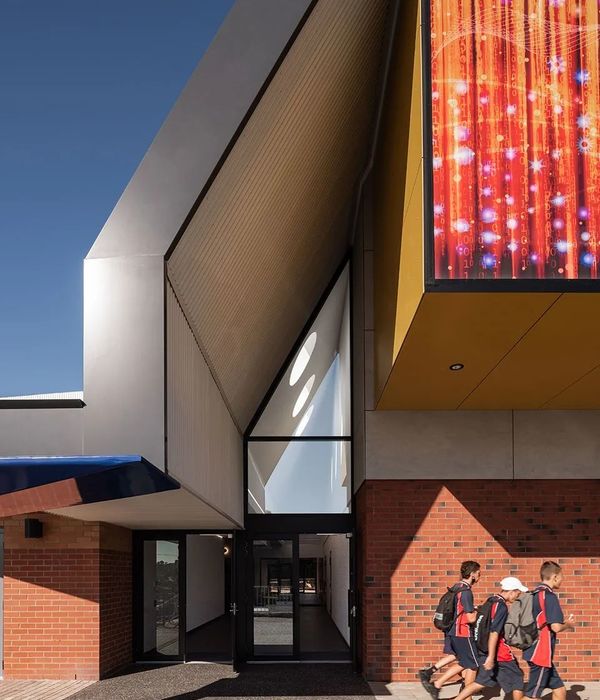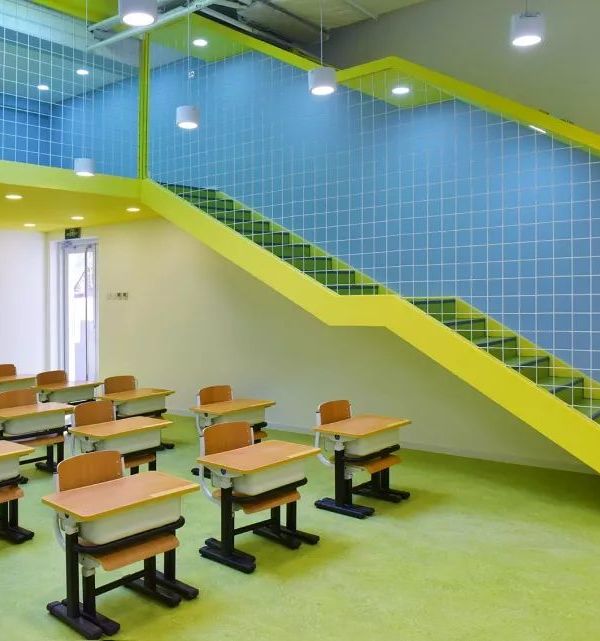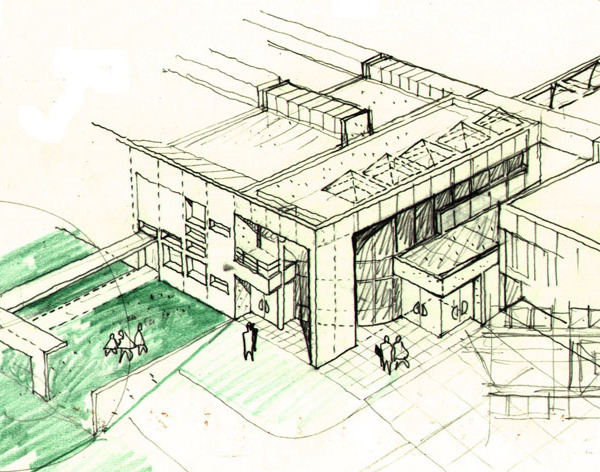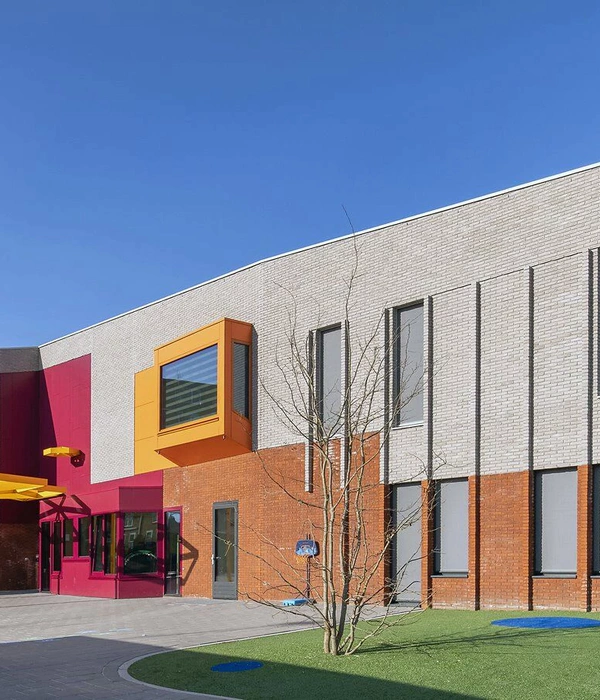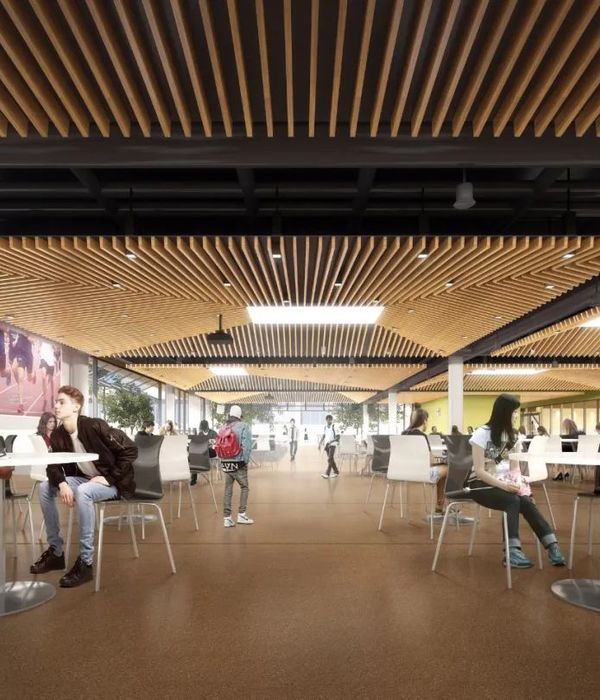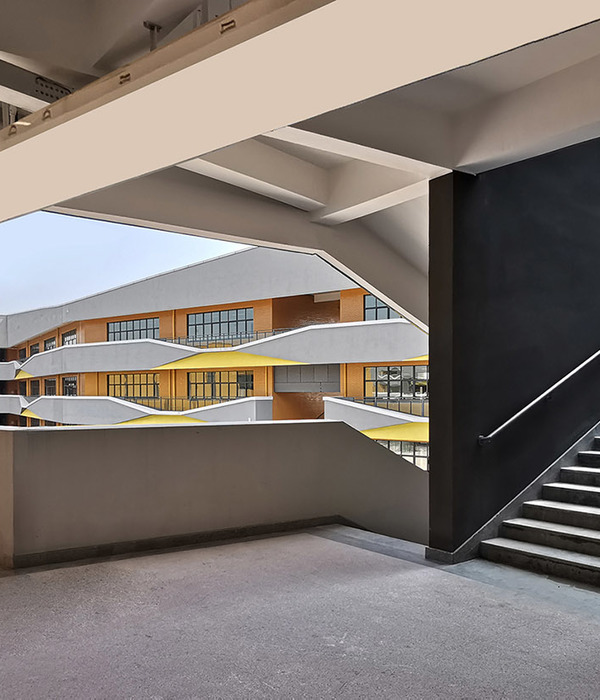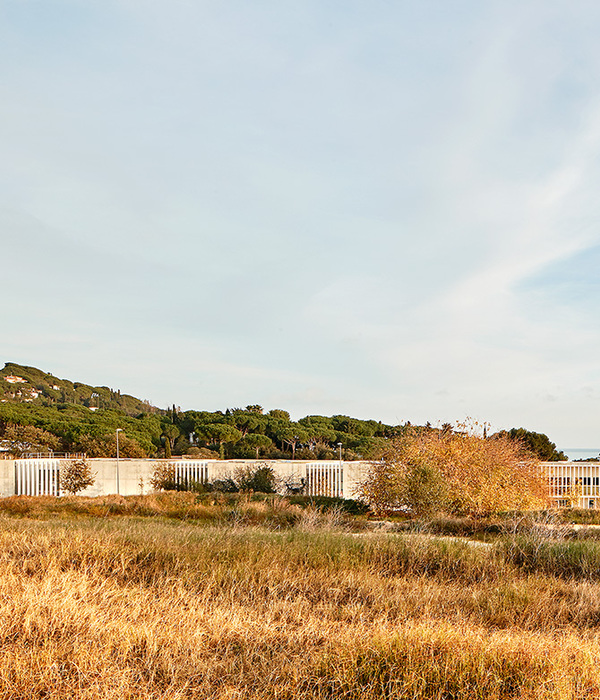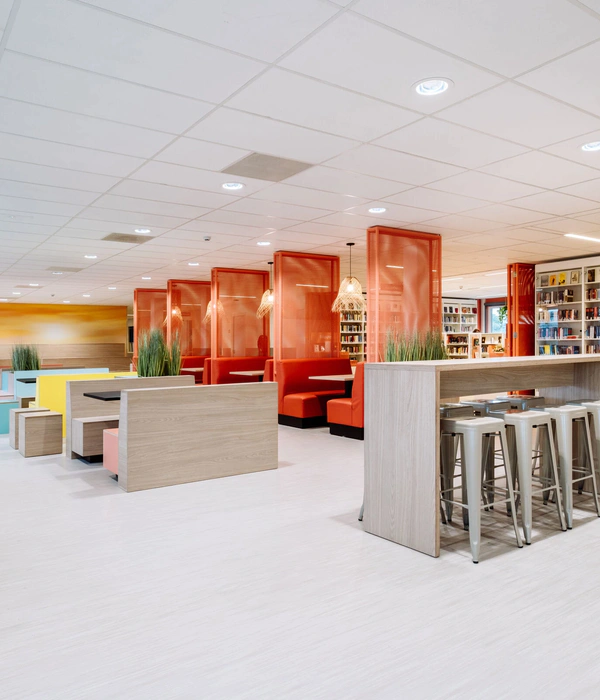2011年2月,座落在丹麦首都哥本哈根以北30公里霍斯霍尔姆自治市的莱恩斯太阳堡幼儿园正式开放,这里可容纳约100名儿童和30名员工。充足的阳光和新鲜的空气,让孩子们能够在健康的环境中享受着充满乐趣的快乐生活。莱恩斯太阳堡幼儿园是丹麦最为环保的零碳综合型幼儿园。它设计独特,可以通过太阳能实现能源自给,它是世界上第一个会产生能源的幼儿园。气候、能源以及环境等领域专家对这一可持续建筑产生了浓厚兴趣。
In February 2011, the integrated childcare centre Solhuset in Hørsholm opened its doors to nearly 100 children and 30 adults. They now enjoy everyday life in a healthy environment with plenty of daylight and fresh air.Solhuset is the most climate friendly daycare centre in Denmark. It is a unique building, self-sufficient with energy, and built as an Active House. This makes Solhuset very interesting not least for professionals within climate, energy and environment.
目标与愿景 Aim and vision
室内气候对托儿中心和学校的重要性不言而喻,它有利于孩子的身体健康,提高学习能力,并减少疾病的发生。
莱恩斯太阳堡幼儿园希望为未来可持续发展的儿童保育机构树立新的标准,坚持“可持续建筑”(Active House)为原则,旨在实现“给予比获得更多”的愿景,努力为孩子、大人和环境带来更多福音。本着这一目标前进,它构建了健康室内气候的建筑环境,孩子们在其中能够学习如何与自然和谐相处,同时避免对环境造成伤害。
Childcare centres and schools have a particular need for a good and healthy indoor climate as it strengthens well- being and learning capacity as well as reduces the risk of diseases.
The vision for Solhuset (The Sunhouse) was to set new standards for future sustainable childcare centres. It rests on the Active House principles of build- ings that give more than they take to the children, adults, environment, and surroundings. Solhuset is show- ing the way; it has the framework for a healthy indoor climate where children learn to live in harmony with nature and without negative impact on the environment.
此项目由VKR Holding A/S(威卢克斯集团母公司)及其战略合作伙伴霍斯霍尔姆自治市政府和ions Børnehuse共同研发设计,并由Hellerup Byg A/S、Christensen & coarkitekter a/s以及Rambøll A/S三家建筑公司倾力打造。其的战略合作伙伴希望,这座“太阳堡”能够成为未来可持续发展的儿童保育中心,在这里,孩子们可以学习如何与自然和环境进行良性的互动。
通过以下几种方式,Sunhouse向世人展示了通往未来建筑之路: 减少使用矿物燃料; 营造健康和舒适的室内气候; 积极投身于环境保护境。
Solhuset was developed in a strategic partnership between Hørsholm Municipality, VKR Holding A/S and Lions Børnehuse, and built by Hellerup Byg A/S in co-operation with Christensen & CO arkitekter a/s and Rambøll A/S. VELUX A/S, VELFAC A/S, SONNENKRAFT, WindowMaster A/S and SUPERWOOD A/S supplied the materials: roof and facade windows, solar thermal and geothermal heat systems, intelligent control system, natural and mechanical ventilation, and cladding.
The partners want Solhuset to be a vi- sion for future childcare centres, where children learn to live in interaction with nature without having a negative impact on the environment.
Solhuset shows the path to buildings of the future by: contributing to reducing the use of fossil fuels, providing a healthy and comfortable indoor climate, contributing positively to the environment and its surroundings.
可持续建筑 Active House
此项目是依据“Active House”的原则进行设计与建造的。可持续建筑原则,就是要在不破坏环境的前提下,为用户创造健康和舒适的生活环境,实现“给予比获得更多”的愿景。
“Active House”原则注重室内环境、室外环境以及可再生能源,为未来可持续发展的建筑建立了新的框架,致力于促进人体健康,提高生活幸福感。
可持续建筑的评估主要从三个方面的互动展开: 环境:融入当地环境,充分利用各种资源,考虑可持续建筑在使用寿命内对环境的整体影响,从而实现可持续建筑与环境进行良性互动。 室内气候:可持续建筑为居住者创造更加健康和舒适的室内环境,保证充足的日照和新鲜空气。此外,使用的材料能够提高生活舒适度、改善室内气候。 能源:可持续建筑高效节能,所有能源均来自建筑本身的聚能系统和电网所收集的可再生能源。
Solhuset was designed and built accord- ing to the Active House principles − a vision of buildings that give more than they take by creating healthy and comfortable lives for their occupants with no negative impact on the environment.
The Active House principles set the frame- work for design and renovation of build- ings that contribute positively to human health and well-being by focusing on indoor and outdoor environments and renewable energy. Such buildings are evaluated by the inter- action between three parameters:
Environment: an Active House interacts positively with the environment through an optimised relationship with its local context, conscious use of resources, and overall environmental impact through- out its life cycle. Indoor climate: an Active House creates healthier and more comfortable indoor conditions for its occupants and ensures a generous supply of daylight and fresh air. The materials used have a positive impact on comfort and indoor climate. Energy: an Active House is energy-effi- cient and all energy needed is supplied by renewable energy sources integrated in the building or by the nearby collec- tive energy system and electricity grid.
▽ 大面积的太阳能板,solar panel
为儿童量身打造的可持续建筑 An Active House for children
太阳堡幼儿园是一个充满乐趣、活力、明亮的新式托儿中心。生活在这里的孩子和大人舒适自在。
布局设计 这里相当于是一个包含着大街、小巷、小广场以及娱乐室的迷你小城镇,它由三大区域组成:幼儿区(与集体活动室相连);少儿区(与集体活动室和露天室相连、通往户外);公共活动室和餐厅设在建筑中部,方便进出。
室内气候 建筑室内气候健康舒适,日照充足,空气清新。房间拥有超高的天花板和屋顶天窗,从而确保了最大限度地利用日光。斜屋顶使建筑不同部分的天花板高度不同。应用于屋顶上的威卢克斯智能电控窗自动开关,保证房内空气流通良好。
The new childcare centre Solhuset is an exciting, lively, and bright building, where both children and adults feel at ease.
Layout Solhuset is laid out as a small village with streets, lanes, small squares and niches, and is divided into three zones: an arrival zone; a small children’s zone with access to group rooms, an outdoor area and an open-air shelter; and a large children’s zone with access to group rooms and the outdoor area. Common exercise rooms and eating facilities are placed in the middle of the house for easy access.
Indoor climate Solhuset has a healthy and comfortable indoor climate with plenty of daylight and fresh air.
It has high-ceilinged rooms and strategically-placed windows to ensure optimum use of daylight. The sloping roof, with roof windows that open and close auto- matically, creates varied ceiling heights for good air circulation in the rooms.
▽ 屋顶上的智能窗,roof windows that open and close auto- matically
为保证良好的室内气候——防止托儿中心过热、保持良好通风、根据室内需要及天气情况关闭或打开电灯,以及节约能源,设计者在屋顶上设置了气象站,并在每个房间里面安装传感器,时刻监测温度和二氧化碳水平。
室内安装了威卢克斯智能控制系统,会根据室内温度自动打开窗户及换气设备以循环新鲜空气,当阳光过于强烈时室外遮阳帘会自动放下以遮挡过强的光线。日光通过东南及西南面的立窗以及顶部天窗照射进室内,使这所“太阳堡”获得的光照比现行的建筑规范所要求的光照量高出3.5倍。
虽然开窗面积仅占建筑面积的28%,但是,起居室的平均采光系数可达7%,即使是房间最角落的地方,平均采光系数也能达到4%。 窗户安装在最佳位置,优化日光利用、保持室内空气充足。 所有房间从至少两个面获取日照。竖直的玻璃幕墙能够确保85%的光线穿过窗户。 自然通风为主,可回收热量的机械通风为辅,加上自动遮阳帘,确保舒适的室内气候。 独特的设计、适宜的房间大小和良好的消声装置使居住者免受噪音的打扰。 为杜绝不良的室内气候影响,我们采用高品质环保健康的建材。
Intelligently controlled sun screening and window opening make the house flexible, allowing the flow of daylight and fresh air to adapt continuously to the weather conditions outside and the needs indoors. Solhuset is built of sound materials that have minimal impact on the indoor climate. Vertical windows in the south- east and south-west facades and roof windows let in more than three times as much light as in a traditional house.
A weather station on the roof, together with temperature and CO2 sensors in every room, ensures a good indoor climate – protecting against superheating, ven- tilating with fresh air, and switching the lights on and off according to needs and weather conditions – and saves energy.
An average daylight factor of 7% in liv- ing rooms and up to 4% in the innermost part of the rooms – even with a window area of only 28% of the floor area. All rooms get daylight from at least two sides. Vertical windows with iron-free glass ensure that up to 85% of the light is transmitted through the windows. Plenty of fresh air is ensured by a combination of automatically controlled natural and mechanical ventilation with heat recovery (hybrid ventilation). Strategically-placed windows ensure optimal use of daylight and adequate air flow. The special design and volume of the rooms, together with the use of sound absorbers, ensure a good acoustic climate. Use of healthy materials ensures mini- mal impact on the indoor climate.
能源 Energy
幼儿园的设计、朝向、建筑材料、窗户及室内气候智能控制系统符合《丹麦2015年建筑法》的要求,确保了建筑能源消耗等级为1级,这还不包括房屋本身利用可再生能源技术产生的能源。
独特的设计使”太阳堡”充分使用可再生能源并实现太阳能自给能源,除了满足自身消耗,还有盈余能源。阳光透过屋顶和立窗源源不断地提供能源。冬天,阳光透过窗户为房屋贡献了所需的一半能源,太阳能和地热能综合系统贡献了房屋室内采暖和热水供应所需的另外一半能源。在朝南的屋顶上,50 m2太阳能集热板可直接收集太阳能,用于室内采暖和热水供应,250 m2太阳能电池可将太阳能转换为电能。由于其独特的设计,每年产生的能源比消耗的能源多出9千瓦时/平方米。
上述盈余能源量意味着,只需要40年时间,就可以抵消使用的主要建材生产时产生的碳排放。从整个使用年限看来,太阳堡幼儿园实现了碳中和。
设计目的如下: 实现碳中和及能源自足, 满足丹麦能源1级能耗要求(51千瓦时/平方米/年),未将可再生能源的使用包括在内, 产生9千瓦时/平方米/年的盈余能源。
太阳堡幼儿园的能源由50 m2太阳能集热板,1000 m地热管道和250 m2太阳能电池提供(每天产生34 kW电能)。 满足房屋及其控制系统和家电工作的能源需求。
Solhuset uses renewable energy sources and was designed to produce more en- ergy than it consumes.
The design, orientation, construction materials, windows and the intelligent control of the indoor climate ensure an energy consumption rated as energy class 1, equivalent to the requirements of the Danish Building Regulations 2015 – even without including the energy produced by the renewable energy technologies in the house.
The sun supplies Solhuset with heat through the roof and facade windows. The windows contribute half the heat needed in wintertime. The remaining requirement for space heating and hot water is produced by a combined solar and geothermal system. Strategically placed on the south-facing roof, 50 m2 solar collectors harvest energy directly from the sun and convert it into heat and hot water, while 250 m2 solar cells con- vert solar energy into electricity. Solhuset was designed to produce 9 kilowatt-hours per m2/year more than it is expected to consume.
The surplus energy production means that in about 40 years the centre will have paid back the CO2 emitted during produc- tion of its primary building materials. That makes Solhuset CO2 neutral throughout its lifetime.
Solhuset is designed to: be CO2 neutral and self-sufficient in energy, meet the requirements of Danish energy class 1 (51 kWh/m2/year) even before the use of renewable energy, produce 9 kWh/m2/year of surplus energy. Energy for Solhuset is produced by the 50 m2 solar collectors, 1000 m geother- mal pipes, and 250 m2 solar cells (34 kW).
This meets the operational needs of the building, the control systems and the appliances.
▽ 一层平面, ground floor
▽ 屋顶平面,roof
建筑公司:Christensen & CO Arkitekter 摄影师:亚当•马克(Adam Mørk) 客户/投资者:霍斯霍尔姆自治市、 VVKR Holding A/S 和Lions Børnehuse 城市:霍斯霍尔姆自治市(Hørsholm) 占地面积:1300 平方米 国家:丹麦 竣工年:2011年
{{item.text_origin}}

